新版PEP五年级英语下册各单元知识点
人教PEP版小学五年级下册英语单元复习课件(全册)
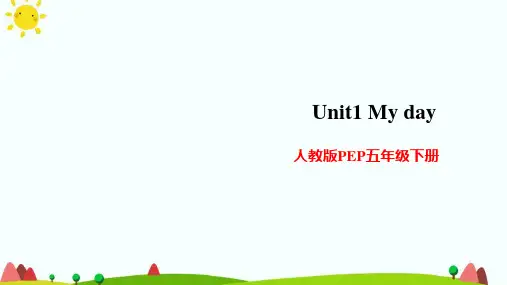
does和doesn’t 在句中的用法
2.一般疑问句:Do(Does)+主语+动词原形+其它。 eg:Do you often play sports? 你经常做运动吗? Yes, I do. / No, I don’t. 当主语为第三人称单数时,要用does构成。 eg:Does she/he often play sports? Yes, she/he does. / No, she/he doesn’t.
语法:动词词组的固定搭配
3.have + 课程/三餐 eg:have English(上英语课), have maths(上数学课)
have breakfast(吃早餐),have lunch(吃午餐) 4.do 做什么事情
do homework(做家庭作业), do kung fu(练功夫), do morning exercises(做早操)
四、Read and translate. 英汉互译。 1. 他的英语书 _h__is_E__n_g_li_s_h_b_o_o_k 2. 我自己 __m__y_s_e_lf____ 3. my teacher __我__的__老__师__ 4. those ____那__些____
2. you (复数形式) __y_o_u_ 4. these (反义词)_t_h_o_s_e
动词变成相应的三单形式
在一般现在时中,跟在第三人称单数后面的动词也要变成相应的三单 形式。 eg: I go shopping every day. 如果主语是三单,动词要变化: He goes shopping every day. She goes shopping every day. Jane goes shopping every day.
PEP小学英语五年级下册各单元知识重点总结
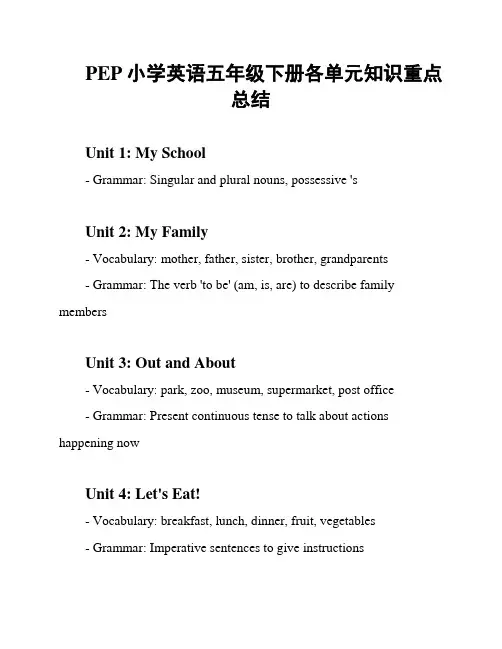
PEP小学英语五年级下册各单元知识重点总结Unit 1: My School- Grammar: Singular and plural nouns, possessive 'sUnit 2: My Family- Vocabulary: mother, father, sister, brother, grandparents- Grammar: The verb 'to be' (am, is, are) to describe family membersUnit 3: Out and About- Vocabulary: park, zoo, museum, supermarket, post office- Grammar: Present continuous tense to talk about actions happening nowUnit 4: Let's Eat!- Vocabulary: breakfast, lunch, dinner, fruit, vegetables- Grammar: Imperative sentences to give instructionsUnit 5: At the Farm- Vocabulary: farmer, barn, cow, pig, chicken- Grammar: There is/There are to talk about existenceUnit 6: Our Town- Vocabulary: street, hospital, police station, fire station, city- Grammar: Prepositions of place (in, on, under, behind, next to)Unit 7: Weather Report- Vocabulary: sunny, cloudy, rainy, snowy, windy- Grammar: Adjectives to describe weatherUnit 8: Fun with Friends- Vocabulary: play, sing, dance, swim, draw- Grammar: Simple present tense to talk about daily activitiesUnit 9: In the Ocean- Vocabulary: fish, dolphin, shark, octopus, seahorse- Grammar: Wh- questions using 'What' and 'Where'Unit 10: Happy Holidays- Vocabulary: Christmas, Easter, Halloween, New Year's Day, Thanksgiving- Grammar: Use of can for ability。
新人教版PEP 【小学五年级英语下册】 单元知识点 归纳总结
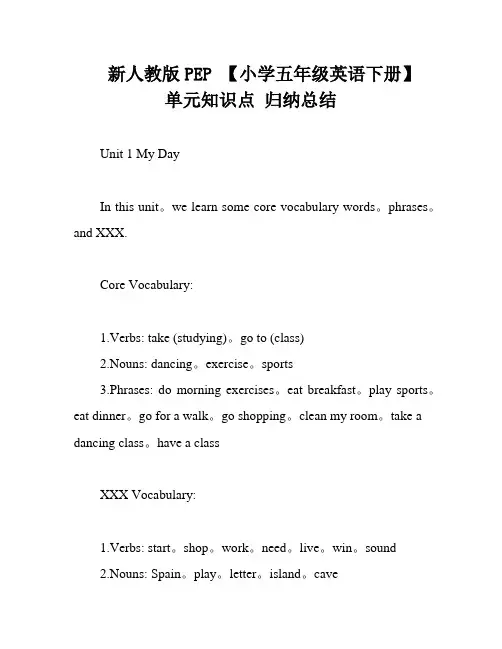
新人教版PEP 【小学五年级英语下册】单元知识点归纳总结Unit 1 My DayIn this unit。
we learn some core vocabulary words。
phrases。
and XXX.Core Vocabulary:1.Verbs: take (studying)。
go to (class)2.Nouns: dancing。
exercise。
sports3.Phrases: do morning exercises。
eat breakfast。
play sports。
eat dinner。
go for a walk。
go shopping。
clean my room。
take a dancing class。
have a classXXX Vocabulary:1.Verbs: start。
shop。
work。
need。
live。
win。
sound2.Nouns: Spain。
play。
letter。
island。
cave3.ns: after4.XXX: when。
XXX。
a.m。
p.m。
why。
last。
also。
busy5.nal Vocabulary: frequency adverbs (always。
usually。
sometimes)Phrases:watch TV。
eat lunch。
go to bed。
go swimming。
go home。
go to schoolCore Sentence Structure:When do you do morning exercises?" "At 7 o'clock."XXX phrase is "good job" to praise XXX.Which season do you like best。
I like winter best。
This sentence means "which one do you like the most" and "like。
【口袋书】人教版PEP五年级下册英语 基础知识汇总
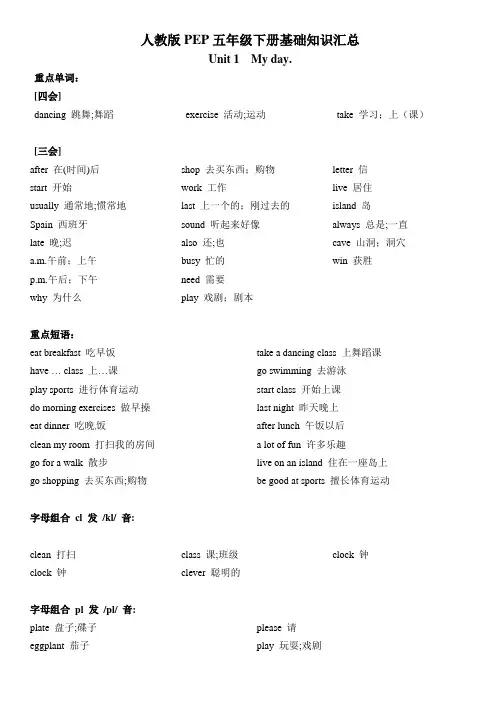
人教版PEP五年级下册基础知识汇总Unit 1 My day.重点单词:[四会]dancing 跳舞;舞蹈exercise 活动;运动take 学习;上(课)[三会]after 在(时间)后start 开始usually 通常地;惯常地Spain 西班牙late 晚;迟a.m.午前;上午p.m.午后;下午why 为什么shop 去买东西;购物work 工作last 上一个的;刚过去的sound 听起来好像also 还;也busy 忙的need 需要play 戏剧;剧本letter 信live 居住island 岛always 总是;一直cave 山洞;洞穴win 获胜重点短语:eat breakfast 吃早饭have … class 上…课play sports 进行体育运动do morning exercises 做早操eat dinner 吃晚饭clean my room 打扫我的房间go for a walk 散步go shopping 去买东西;购物take a dancing class 上舞蹈课go swimming 去游泳start class 开始上课last night 昨天晚上after lunch 午饭以后a lot of fun 许多乐趣live on an island 住在一座岛上be good at sports 擅长体育运动字母组合cl 发/kl/ 音:clean 打扫clock 钟class 课;班级clever 聪明的clock 钟字母组合pl 发/pl/ 音:plate 盘子;碟子eggplant 茄子please 请play 玩耍;戏剧重点句型:1.询问别人什么时候做某事的问句及回答:-- When do/does + 主语+ 动词(短语)原形(+ 其他)?-- 主语(+ 频度副词)+ 动词(短语)原形/ 第三人稀单数形式+ at + 具体时间/ At + 具体时间.-- When do you get up? 你什么时候起床?-- I get up at 5 o'clock. 我5点起床。
人教版PEP小学英语五年级下册知识点汇总(最新)
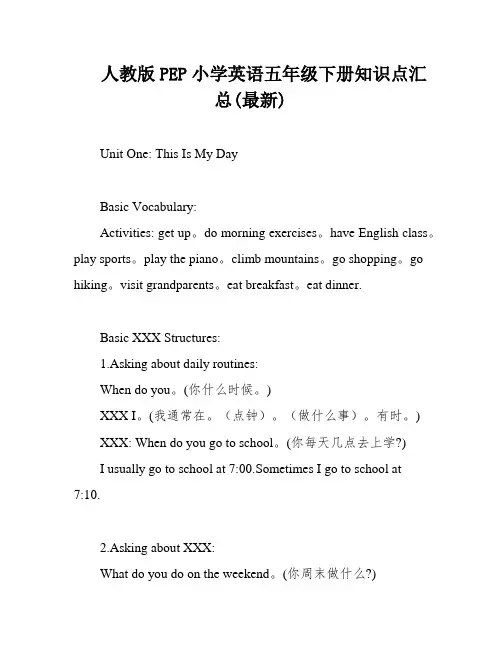
人教版PEP小学英语五年级下册知识点汇总(最新)Unit One: This Is My DayBasic Vocabulary:Activities: get up。
do morning exercises。
have English class。
play sports。
play the piano。
climb mountains。
go shopping。
go hiking。
visit grandparents。
eat breakfast。
eat dinner.Basic XXX Structures:1.Asking about daily routines:When do you。
(你什么时候。
)XXX I。
(我通常在。
(点钟)。
(做什么事)。
有时。
)XXX: When do you go to school。
(你每天几点去上学?)I usually go to school at 7:00.Sometimes I go to school at7:10.2.Asking about XXX:What do you do on the weekend。
(你周末做什么?)XXX I。
(我通常/经常。
有时。
)XXX: What do you do on the weekend?I often play XXX I go shopping with my mom.3.Introducing one's own habits:Every weekend。
I go hiking。
(我每个周末远足。
)Every day。
I do my homework at 8:00 in the evening。
(我每天晚上8点做作业。
)4.Asking XXX:What do you do。
(你是干什么的?)Time:morning。
afternoon。
evening。
noon。
at night。
6:00.on Sunday。
人教版PEP小学英语五年级下册知识点汇总(最新)
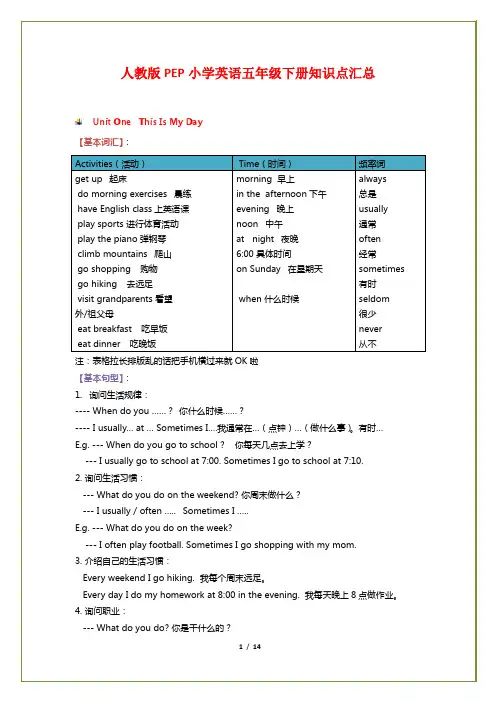
人教版PEP小学英语五年级下册知识点汇总Unit One This Is My Day【基本词汇】:Activities(活动) Time(时间)频率词get up 起床do morning exercises 晨练 have English class上英语课 play sports 进行体育活动 play the piano 弹钢琴climb mountains 爬山go shopping 购物go hiking 去远足visit grandparents 看望外/祖父母eat breakfast 吃早饭eat dinner 吃晚饭morning 早上in the afternoon下午evening 晚上noon 中午at night 夜晚6:00 具体时间on Sunday 在星期天when 什么时候always总是usually通常often经常sometimes有时seldom很少never从不注:表格拉长排版乱的话把手机横过来就OK啦【基本句型】:1. 询问生活规律:---- When do you ……?你什么时候……?---- I usually… at …Sometimes I….我通常在…(点钟)…(做什么事)。
有时…E.g. --- When do you go to school ? 你每天几点去上学?--- I usually go to school at 7:00. Sometimes I go to school at 7:10.2. 询问生活习惯:--- What do you do on the weekend? 你周末做什么?--- I usually / often ….. Sometimes I …..E.g. --- What do you do on the week?--- I often play football. Sometimes I go shopping with my mom.3. 介绍自己的生活习惯:Every weekend I go hiking. 我每个周末远足。
新人教版PEP五年级英语下册各单元知识点总结
新人教版PEP五年级英语下册各单元知识点总结Unit 1: Our Classroom- Classroom objects and their names- Sentences to describe classroom objects and their locationsUnit 2: Our Clothes- Clothing items and their names- Describing clothing using colors and patterns- How to ask and answer questions about what someone is wearingUnit 3: I Love Sports- Sports vocabulary and their names- Describing sports using adjectives (e.g., fun, exciting, tiring)- Expressing preferences for certain sportsUnit 4: My Birthday Party- Vocabulary related to birthdays and celebrations- Describing activities at a birthday party- Expressing likes and dislikes about different party elementsUnit 5: At the Farm- Vocabulary related to farm animals and their names- Describing farm animals using adjectives (e.g., big, small, noisy) - Describing activities at a farm (e.g., feeding animals, milking cows)Unit 6: A Fun Day Out- Vocabulary related to amusement park rides and activities- Describing activities and experiences at an amusement park- Expressing likes and dislikes about different rides and activitiesUnit 7: A Friendly Letter- Vocabulary related to writing a letter (e.g., greeting, closing, signature)- Structure of a friendly letter- Writing a letter to a friend, describing personal experiences or activitiesUnit 8: Our Pets- Vocabulary related to pets and their names- Describing pets using adjectives (e.g., cute, friendly, playful)- Talking about responsibilities and caring for petsUnit 9: Our Earth- Vocabulary related to the environment and nature- Describing different natural elements (e.g., mountains, rivers, plants)- Expressing concerns and suggesting actions to protect the environmentUnit 10: Fun with Art- Vocabulary related to art and artistic activities- Describing different art forms (e.g., drawing, painting, sculpting) - Talking about personal preferences for different art activitiesUnit 11: Let's Travel- Vocabulary related to travel and transportation- Describing different modes of transportation (e.g., car, train, airplane)- Talking about travel experiences and preferences for different destinationsUnit 12: Healthy Habits- Vocabulary related to health and healthy habits- Describing different healthy habits (e.g., exercise, balanced diet, enough sleep)- Talking about personal choices and habits for a healthy lifestyle。
(完整)PEP小学英语五年级下册各单元知识重点归纳-推荐文档
PEP五年级下册各单元知识重点Unit 1 This Is My Day我会背:do morning exercises晨练eat breakfast吃早饭have english class上英语课play sports进行体育运动eat dinner吃晚饭when什么时候evening夜晚;晚上get up起床at在……点钟usually通常;一般noon中午climb mountains爬山go shopping购物;买东西play the piano弹钢琴visit grandparents看望祖父母go hiking去远足weekend周末often经常sometimes有时候话题: 日常生活1. When do you do morning exercises? 你什么时候做早操?.usuall.d.mornin.exercise.a.8:00......我经常八点钟做早操。
(.usuall.ge.u.a.12:0.noo........我经常在中午十二点起床。
)2. When do you eat dinner ? 你什么时候吃晚餐?.ea.dinne.a.7:0.i.th.evening........我在晚上七点钟吃晚餐。
3.Wha.d.yo.d.o.th.weeken......... 你周末做什么?.usuall.clim.mountains. 我通常去爬山. .ofte.pla.sport..我经常经行体育锻炼。
Sometime..pla.th.pian..有时候我弹钢琴。
Unit 2 My Favourite Season我会背:spring春天summer夏天fall秋天winter冬天season季节which哪一个best最;极swim游泳fly kites放风筝skate滑冰make a snowman堆雪人plant trees种树why为什么because因为sleep睡觉favourite 最喜爱的话题: 季节1. Which season do you like best ? I like spring best.(Spring.)你最喜欢是什么季节?我最喜欢春季。
完整版)人教版PEP五年级英语下册各单元知识点
完整版)人教版PEP五年级英语下册各单元知识点Unit 1 My DayIn this unit。
we will focus on the following vocabulary words:1.Four-word phrases:XXXHave classPlay sportsExerciseMorning exercisesEat XXXClean my roomGo for a walkGo shoppingXXXDancingTake a dancing class2.Three-word phrases: WhenAfterStartUsuallySpainLateAMPMWhyShopWorkLastSoundAlsoBusyNeedPlayXXXLiveIslandAlwaysCaveGo swimmingXXXXXX words。
we will also cover other daily XXX up。
eating lunch。
and going to bed。
We will also learn how to wash our face and clothes。
watch TV。
play ping-pong and the pipa。
go swimming and running。
do homework and kung fu。
and play XXX.We will also learn about frequency adverbs。
including always。
usually。
often。
and sometimes。
Finally。
we will cover the n words when and why。
and XXX we do certain activities.One XXX structure we will learn is how to ask someone when they do something and how to answer。
(完整版)新版PEP五年级下册知识点总结,推荐文档
in at When 新版 PEP 五年级下册知识点总结Unit 11. 吃早饭 eat/ have breakfast2. 上……课 have…class3. 进行体育运动 play/ do sports4. 做早操 do morning exercises5. 吃晚饭 eat/ have dinner6. 打扫我的房间 clean my room7. 散步 go for a walk8. 去买东西、购物 go shopping 9. 上舞蹈课 take a dancing class 10. 听起来好像 sound like11. 吃午饭 eat/ have lunch 12. 去游泳 go swimming 13. 午前,上午 a.m. 14. 午后,下午 p.m. 15. 通常 usually 16. 西班牙 Spain 17. 起床 get up18. 吃早饭 eat/have breakfast 19. 上床睡觉 go to bed 20. 有时 sometimes21. 昨晚 last night22. 打乒乓球 play ping-pong 23. 许多 a lot of/ lots of 24. 经常 often25. 做作业 do homework 26. 看电视 watch TV27. 洗衣服 wash my clothes 28. 在周末 on the weekend 29. 善于,擅长 be good at1. – When do you finish class in the morning? 你们上午的课到几点结束? – We finish class at 1 o’clock . 我们一点钟结束。
2. – When do you usually eat dinner Spain ? 在西班牙你们通常什么时候吃晚饭? – Usually 9:30 or 10 o’clock. 通常在九点三十或十点钟。
- 1、下载文档前请自行甄别文档内容的完整性,平台不提供额外的编辑、内容补充、找答案等附加服务。
- 2、"仅部分预览"的文档,不可在线预览部分如存在完整性等问题,可反馈申请退款(可完整预览的文档不适用该条件!)。
- 3、如文档侵犯您的权益,请联系客服反馈,我们会尽快为您处理(人工客服工作时间:9:00-18:30)。
PEP五年级英语下册各单元知识点一. 频度副词。
always总是,一直(100%)usually通常(80%)often 经常(60%)sometimes有时(30%)二. 重点句型。
1. 询问别人什么时候做某事的句型及回答。
句型结构:问:When do you+动词短语原形+其他?(你/你们什么时候做某事?)答:I/We(+频度副词)+动词短语原形+at+具体时间(我/我们通常在几点做某事。
)例:问:When do you go to bed?(你什么时候上床睡觉?)答:I go to bed at 9:00p.m (我晚上9点上床睡觉。
)注意:当主语是第三人称单数(he,she,it,单个人名或单数名词)时,助动词do要变成does, 句型结构是:When does+主语(第三人称单数)+动词短语原形+其他?2. 询问别人周末做什么的句型及回答。
句型结构:问:What do you do on the weekend?(你周末做什么?)答:I(+频度副词)+动词(短语)+其他。
例:问:What do you do on the weekend?(你周末做什么?)答:I usually read books. (我通常看书。
)注意:当主语是第三人称单数(he,she,it,单个人名或单数名词)时,助动词do要变成does,句型结构是:What does+主语(第三人称单数)+do+on the weekend?三.句型转换:1.肯定句↔一般疑问句:I usually get up at 6:00. ↔ Do you usually get up at 6:00?肯定回答:Yes, I do. 否定回答:No, I don’t.(第三人称时) He eats dinner at 6:00p.m. ↔ Does he eat dinner at 6:00p.m.?2.肯定句↔否定句:I like playing the piano. ↔ I don’t like playing the piano.I can play the piano. ↔ I can’t play the piano.3.划线提问:⑴I often go shopping on the weekend. →When do you go shopping ?⑵I often go shopping on the weekend. →What do you do on the weekend?⑶I go to school at 7:00. →When do you go to school?四. 四会句子:When do you finish class in the morning ? 你们上午的课到几点结束?We finish class at 1 o’clock . 我们一点钟结束上午的课。
What do you do on the weekend ? 你周末做什么?I often watch TV and play ping-pong with my father .我经常看电视,也常和我爸一起打乒乓球。
五. 语音:cl /kl/ clean clock class clever pl /pl / plate eggplant please play一. 重点句型1. 询问别人天气怎么样的句型及回答。
句型结构:问:What’s the weather like+时间+地点?(······天气怎么样?)答:It’s+表示天气的形容词例:问:What’s the weather like in winter in Beijing?(北京冬天的天气怎么样)答:It’s cold and windy.(有风而且寒冷。
)2. 询问别人最喜欢的季节句型及回答。
句型结构:问:Which season do you like best? (你最喜欢的季节是哪一个?)答:I like+季节+best或直接说季节名称。
同义句还有:What’s your favourite season?3. 询问别人喜欢某个季节的原因的句型及回答。
句型结构:问:Why do you like+季节名称?或直接用“Why”来提问。
答:一般要用“because”引导的句子来说明理由,可以从天气相关的活动等方面来说。
例:问:Why do you like spring?(你为什么喜欢春天?)答:Because I can fly kites.(因为我能放风筝。
)问:Why do you like summer?(你为什么喜欢夏天?)答:Because I can go swimming everyday.(因为我每天都能去游泳。
)问:Why do you like autumn?(你为什么喜欢秋天?)答:Because the weather is cool.(因为天气凉爽。
)问:Why do you like winter?(你为什么喜欢冬天?)答:Because I can make a snowman.(因为我能堆雪人。
)二. 四会句子:Which season do you like best , Mike ? 迈克,你最喜欢哪个季节?Winter . 冬天。
Why ?为什么?Because I like summer vacation ! 因为我喜欢暑假!三. 句型转换:1. 肯定句↔一般疑问句:⑴I like summer. ↔ Do you like summer?肯定回答:Yes, I do. 否定回答:No, I don’t.⑵It is sunny and hot. ↔ Is it sunny and hot?肯定回答:Yes, it is. 否定回答:No, it isn’t.⑶The sky is very blue. ↔ Is the sky very blue?The leaves are colourful. →Are the leaves colourful?2. 划线提问:⑴I like summer best. →Which season do you like best?⑵My favourite season is winter. →What is your favourite season?⑶It is sunny in May in Beijing. →What is the weather like in May in Beijing?⑷I’d like to swim. →What would you like to do?四.语音:br /br/ brown library brother umbrellagr /gr/ green grapes grandpa grow一、注意:1. 月份的首字母一定要大写。
2. May,June, July没有缩写形式,September的缩写形式是“Sept.”,其他月份单词的缩写形式都是有单词的前三个字母加“·”构成。
3. 月份的缩写形式不用在句子中,只能单独使用。
4. 表示“在几月”时,要在月份单词前面加介词in, 但在几月几日用on。
二. 活动名称sports meet 运动会Easter party 复活节聚会school trip 学校旅行Chinese test 语文测试singing contest歌咏比赛birthday party生日聚会三. 介词in . on. at的用法。
1. in后面+上午/下午/晚上/月份/季节/年份。
如:in the morning, in April, in winter, in 2015.2. on的后面+具体的某一天。
如:on Monday, on April 3rd, on Friday morning.3. at后面+具体的时间点或与其他词构成固定搭配。
如:at six o’clock, at 12:30 at noon.四. 重点句型。
1. 问答某个活动或节日在几月份的句型及回答。
句型结构:问:When is+活动或节日名称?答:It’s in+月份。
例:问:When is Christmas?(圣诞节在什么时候?)答:It’s in December.(在十二月。
)2. 询问别人将要做什么的句型及回答。
句型结构:问:What will you do+其他?答:I will····=I’ll···例:问:W hat will you do for your mum on Mother’s Day?(母亲节你将为你妈妈做什么?)答:I’ll give her some flowers.(我将送给她一些花。
)3. 表达“我们将要···”的句型。
We’ll···=We will 后面+动词原形,这是一个一般将来时的句子,表示将来某个时间要发生的动作或事情。
例:We’ll have a school trip.(我们将有一次学校旅行。
)We’ll have a sin ging contest.(我们将有一次歌咏比赛。
)We’ll take a dancing class.(我们将要上一节舞蹈课。
)五.句型转换:⒈肯定句→一般疑问句:①把be动词(am/is/are)调到句首:第一、二人称:My birthday is in June. ↔ Is your birthday in June?第三人称:John’s birthday is May 1st. ↔ Is John’s birthday May 1st?(这里主要讲的是生日,因此回答一律用it 来回答:Yes, it is. / No, it isn’t. )⒉肯定句↔否定句:在be动词(am/is/are)后+ not:His birthday is in January ↔ His birthday isn’t in January ( is not = isn’t )⒊划线提问:My birthday is in February. →When is your birthday?Amy’s birthday is Apr. 9th. →Whose birthday is Apr. 9th ?The Children’s Day is June 1st . →When is the Children’s Day?六.四会句子:When is the party ? 聚会什么时候举行?It’s in April . 在4月。
